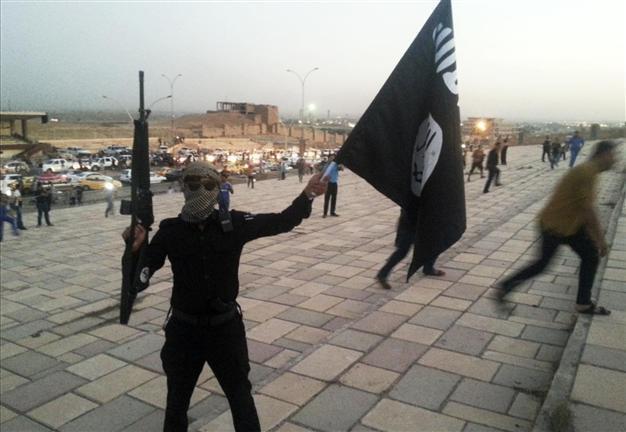Syria’s UN representative: ‘Let’s open a new page’
NEW YORK

A fighter of the Islamic State of Iraq and the Levant (ISIL) holds an ISIL flag and a weapon on a street in the city of Mosul, June 23. REUTERS Photo
“Why not leave the dark pages of history behind? I hope we can turn over a new page in our relations.”
These are the words coming out of the mouth of Syria’s Permanent Representative to the United Nations, Bashar al-Jaafari. I visited him in his office, in Syria’s mission in New York, yesterday. We talked about the recent developments in the region, with a specific focus on Turkey-Syria relations. It looks like that the regional context has made President Bashar al-Assad revisit his policy toward Turkey.
Our conversation started with al-Jaafari restating Syria’s usual argument that Turkey has been supporting the jihadists in Syria and played an important role in the rise of their power. Yet this time he put this argument into a much wider context. Accordingly, the West is trying to split the countries in the Middle East to pursue its interests. And regional countries such as Turkey, Qatar and Saudi Arabia are serving to this end by supporting the terrorists.
But then why has Turkey been complaining that European countries are not providing it with intelligence on the jihadists travelling from Europe to Turkey? Or why has Turkey put al-Nusra on its list of terrorist organizations? He says this is due to the pressure applied by the West.
Al-Jaafari thinks Turkey and Syria share the same destiny: “We are both abused by the West. We are both victims. And we can fight against this only by cooperating.” He underlines that both countries are losing a golden opportunity: The economic potential and the role they could play in the region.
He also emphasizes Turkey and Syria’s common religious identity. “The West pictures Muslims as terrorists and the bad guys. This is not only sad for [Prime Minister Recep Tayyip] Erdoğan. But also for us. We are all Muslims. We need to fight against this together. Otherwise how are we going to explain this to our grandchildren?”
But is it not too late? According to al-Jaafari, it is never too late. However, he also adds that this would not be possible under Erdoğan’s leadership. “Turkey was beyond a partner for us. However, Erdoğan disappointed us. He acted ideologically but politicians should be rather pragmatic.” Yet he adds: “We could still cooperate if he would change his attitude. But I know he won’t.”
So then how will this cooperation take place? “With new faces and new policy,” he says. Apparently, the fact that Erdoğan will be replaced by a new prime minister following the presidential elections is regarded as an opportunity. At this point he refers to President Abdullah Gül, saying that his approach is radically different, in a positive way.
Does he hold only Turkey responsible for the deterioration of the relations? He says that the political aspect of the relations went way ahead of the economic and social-cultural relations. So the two countries didn’t have any chance to go through a transition period to first rebuild trust.
Does al-Assad not have any guilt? I remind al-Jaafari that al-Assad had promised Erdoğan to implement reforms and has never fulfilled it. Al-Jaafari blames Erdoğan for having tried to dictate to al-Assad what he should and should not do, and not respecting Syria’s sovereignty.
So what about the reforms then? Doesn’t the regime criticize itself at all? “We don’t say we are angels. If the regional and international powers would not have played any role in our country, I could say, “I wish we had implemented more reforms.” But this is not the case. And there is always more a government can do.”
And my last question: What’s the exit then? Al-Jaafari’s reply surprises me: “We cannot solve this by ourselves. We need other states’ help. We need Turkey’s help, Turkey’s brokerage and cooperation.”
What he says while seeing me off at the door actually summarizes the mood of our conversation: “I hope things between our countries will be good as soon as possible. Because we need it.”
